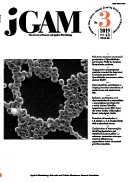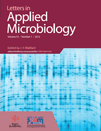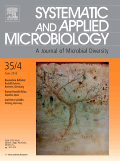
ANNALS OF MICROBIOLOGY
Scope & Guideline
Transforming ideas into impactful microbiological advancements.
Introduction
Aims and Scopes
- Microbial Diversity and Ecology:
Research on the diversity and ecological roles of microorganisms in various environments, including soil, marine, and human-associated ecosystems. This includes studies on microbial community structures, interactions, and their functional implications. - Biotechnology and Applied Microbiology:
Investigations into the application of microorganisms in biotechnology, including biotransformation processes, fermentation technologies, and the production of bioactive compounds, enzymes, and probiotics. - Pathogen Biology and Antimicrobial Resistance:
Studies focused on understanding the biology of pathogenic microorganisms, mechanisms of virulence, and the emergence of antimicrobial resistance, providing insights into public health challenges. - Probiotics and Fermented Foods:
Exploration of the role of probiotics and the microbiological aspects of fermented foods, including their health benefits, safety assessments, and potential applications in food technology. - Environmental Microbiology:
Research addressing microbial processes in environmental contexts, including bioremediation, soil health, and the impact of anthropogenic activities on microbial communities.
Trending and Emerging
- Metagenomics and Microbiome Studies:
There is a growing trend in the use of metagenomic approaches to study complex microbial communities and their functions in various environments, highlighting the importance of the microbiome in health and ecosystem dynamics. - Probiotic Research and Functional Foods:
Research on probiotics and their health benefits continues to gain momentum, with a focus on the safety, efficacy, and mechanisms of action of probiotic strains derived from diverse sources, including traditional fermented foods. - Environmental Microbiology and Bioremediation:
Emerging studies are increasingly focusing on the use of microorganisms for environmental remediation, including the biotransformation of pollutants and the restoration of contaminated ecosystems, driven by global environmental challenges. - Microbial Interactions and Community Dynamics:
There is a rising interest in understanding the interactions within microbial communities, including symbiosis, competition, and cooperative behaviors, which are crucial for applications in agriculture and ecosystem management. - Antimicrobial Resistance and Alternative Therapies:
Research addressing antimicrobial resistance is increasingly focusing on alternative therapeutic strategies, including bacteriophage therapy, and the discovery of novel antimicrobial compounds from natural sources.
Declining or Waning
- Traditional Antibiotic Research:
Research dedicated to conventional antibiotics and their mechanisms of action has seen a decline, possibly due to a shift towards exploring alternative treatments and understanding the complexities of antimicrobial resistance. - Basic Microbial Physiology:
Studies focusing purely on the basic physiological traits of microorganisms without application to health or industry have decreased, as researchers increasingly seek to connect physiological findings to practical applications or ecological impacts. - Isolated Culture Studies:
Research involving the study of microorganisms in isolation, without consideration of their ecological context or interactions with other microbes, has become less prominent, reflecting a broader trend towards holistic approaches in microbiology.
Similar Journals

ARCHIVES OF MICROBIOLOGY
Pioneering Insights in Microbiology Since 1974The Archives of Microbiology, published by Springer, is a reputable journal in the field of microbiology, serving as a vital platform for the dissemination of groundbreaking research and critical reviews since its inception in 1974. With an ISSN of 0302-8933 and an E-ISSN of 1432-072X, this journal operates out of Germany and maintains a global reach, promoting high-quality scholarship across multiple disciplines, including biochemistry, genetics, and molecular biology, as evidenced by its Q2 ranking in Medicine (miscellaneous) and consistent Q3 placements in other categories in 2023. Although the journal does not offer open access options, its rigorous peer-review process ensures that published articles are of the highest standard, making it an essential resource for researchers, professionals, and students keen on advancing their understanding of microbial sciences. As the journal converges toward 2024, it remains committed to fostering innovative microbiological research and facilitating interdisciplinary dialogue within the scientific community.

FOLIA MICROBIOLOGICA
Innovating Insights in Microbial Research.FOLIA MICROBIOLOGICA is a distinguished academic journal published by SPRINGER, focusing on the intricate realms of microbiology and its contributions to medicine. Since its inception in 1957, the journal has been a vital platform for disseminating pioneering research, addressing contemporary challenges in the field while facilitating discourse among researchers, clinicians, and students alike. With an ISSN of 0015-5632 and an E-ISSN of 1874-9356, FOLIA MICROBIOLOGICA publishes original articles, reviews, and critical insights that span not only traditional microbiological studies but also innovative applications in immunology and biotechnology. The journal is categorized within the esteemed Q2 tier in Medicine (Miscellaneous) and holds a Q3 rating in Microbiology as of 2023, reflecting its significant impact and relevance in the scientific community. Although it does not currently offer open access, it remains a respected resource, enabling professionals and students to keep abreast of advancements from its base in the Netherlands. With a strong commitment to quality and rigorous peer-review, FOLIA MICROBIOLOGICA serves as an essential repository of knowledge, fostering the next generation of microbiologists and medical practitioners.

CANADIAN JOURNAL OF MICROBIOLOGY
Championing Excellence in Microbial ScienceThe Canadian Journal of Microbiology, published by Canadian Science Publishing, is a well-respected journal established in 1954 that serves as a vital platform for advancing knowledge in the fields of microbiology and related disciplines. With an ISSN of 0008-4166 and an E-ISSN of 1480-3275, this journal is recognized for its rigorous peer-review process and its commitment to disseminating high-quality research that spans applied microbiology, biotechnology, genetics, immunology, and more. Currently indexed in several prestigious databases, its impact factor and category quartiles highlight its significance, ranking in the top tiers of applied microbiology and biotechnology as well as other intersecting fields. The journal provides an essential resource for researchers, professionals, and students seeking to stay informed on the latest advancements and breakthroughs, facilitating collaboration and innovation in the microbiological sciences. Set in the dynamic landscape of academia from its headquarters in Ottawa, Canada, the Canadian Journal of Microbiology remains steadfast in its mission to promote research that addresses key challenges and opportunities within the microbiological community.

AIMS Microbiology
Pioneering discoveries in microbiology and life sciences.AIMS Microbiology, published by the American Institute of Mathematical Sciences (AIMS), is an esteemed Open Access journal dedicated to advancing the field of microbiology since its inception in 2015. With an ISSN of 2471-1888, the journal aims to disseminate high-quality research and innovative findings pertaining to both fundamental and applied microbiology, encompassing areas such as medical microbiology, immunology, and related life sciences. Recognized for its academic rigor, AIMS Microbiology has achieved a significant standing, evidenced by its current Q2 ranking in both Microbiology and Medical Microbiology categories, along with impressive percentile rankings within prestigious Scopus metrics. Based in the United States, the journal not only emphasizes accessibility and widespread dissemination of knowledge but also plays a crucial role in fostering collaboration among researchers and professionals in the microbiological sciences. By providing a platform for collaborative research and innovative ideas, AIMS Microbiology is poised to influence the future development and application of microbiological research, making it a valuable resource for students, researchers, and practitioners alike.

WORLD JOURNAL OF MICROBIOLOGY & BIOTECHNOLOGY
Catalyzing Innovation in Microbial Processes and TechnologiesWORLD JOURNAL OF MICROBIOLOGY & BIOTECHNOLOGY, published by Springer, serves as a pivotal forum for advancing the fields of microbiology and biotechnology since its inception in 1990. Located in the Netherlands, this esteemed journal has secured a prominent position in the academic landscape, recognized for its strong impact factor and prestigious Q2 category rankings across disciplines such as Applied Microbiology, Biotechnology, and Physiological Sciences. Researchers and professionals utilize this journal to disseminate innovative findings and explore emerging technologies that are transforming the scientific landscape. With a robust submission rate and high visibility among the academic community, the journal fosters interdisciplinary collaboration, encouraging discussions that bridge gaps between theory and practical applications. As it converges into 2024, the WORLD JOURNAL OF MICROBIOLOGY & BIOTECHNOLOGY continues to be a vital resource for scholars aiming to enhance our understanding of microbial processes and biotechnological advances.

JOURNAL OF GENERAL AND APPLIED MICROBIOLOGY
Exploring the vital role of microorganisms in health and environment.JOURNAL OF GENERAL AND APPLIED MICROBIOLOGY, published by the MICROBIOL RES FOUNDATION, is a vital resource in the fields of applied microbiology and biotechnology, as well as in diverse medical applications, serving an academic community dedicated to advancing microbial science. Established in 1955, this journal has a rich history of disseminating innovative research and insights into the intricate world of microorganisms. With an ISSN of 0022-1260 and an E-ISSN of 1349-8037, the journal maintains high scholarly standards and robustness, reflected in its 2023 Scopus rankings placing it in the Q3 and Q4 quartiles within its categories. While primarily based in Japan, the journal engages a global audience, offering valuable contributions that inform both theoretical perspectives and practical applications in microbiology. Despite being a non-open-access publication, it provides pivotal research findings essential for academics, professionals, and students alike, fostering a deeper understanding of microbial impact on health and the environment.

LETTERS IN APPLIED MICROBIOLOGY
Catalyzing Change in Applied Microbiology ResearchLETTERS IN APPLIED MICROBIOLOGY, published by OXFORD UNIVERSITY PRESS, is a prominent journal in the field of applied microbiology, serving as an essential platform for researchers and professionals to disseminate innovative findings. With an ISSN of 0266-8254 and an E-ISSN of 1472-765X, this peer-reviewed journal has been contributing to the scientific community since 1985 and continues to engage with cutting-edge research through 2024. With its current Scopus ranking placing it in the 45th percentile of its category, specifically at rank #70 out of 127 in the Applied Microbiology and Biotechnology field, it underscores its significance in advancing knowledge and applications pertinent to microbial science. Although it is not open access, LETTERS IN APPLIED MICROBIOLOGY offers comprehensive insights aimed at enhancing the understanding of microbiological phenomena in practical scenarios, making it a valuable resource for both seasoned experts and emerging scholars.

JOURNAL OF MICROBIOLOGY
Transforming knowledge into solutions for environmental challenges.JOURNAL OF MICROBIOLOGY, published by the Microbiological Society Korea, is a prestigious peer-reviewed journal dedicated to the advancement of knowledge in the fields of microbiology, applied microbiology, and biotechnology. Established in 1996, this journal serves as a vital platform for researchers and professionals from around the globe to disseminate their findings and engage in multidisciplinary discussions pertaining to microbial sciences. With an H-index that reflects its impact, the journal holds a commendable Q2 ranking in key categories including Applied Microbiology and Biotechnology, as well as Medicine (Miscellaneous), which underscores its significance in the academic community. Despite being a subscription-based journal, the JOURNAL OF MICROBIOLOGY aims to contribute to the understanding of microbial processes and their applications, facilitating advancements that are essential in health, industry, and environmental sciences. Researchers, students, and practitioners are encouraged to explore this rich resource for the latest research and trends in microbiology.

APPLIED MICROBIOLOGY AND BIOTECHNOLOGY
Exploring the frontiers of microbial innovation.Applied Microbiology and Biotechnology, an esteemed journal published by Springer, serves as a vital resource in the domains of microbiology and biotechnology. With an impressive impact factor reflecting its quality, the journal holds Q1 rankings in various categories including Applied Microbiology and Biotechnology, Biotechnology, and Medicine (Miscellaneous) as of 2023. Spanning the years from 1984 to 2024, it underscores its commitment to disseminating groundbreaking research that addresses pressing challenges in health, agriculture, and environmental sustainability. The journal is rigorously indexed and holds respectable positions in Scopus rankings, notably within the top 15% of Applied Microbiology and Biotechnology and the top 15% in Biochemistry, Genetics, and Molecular Biology. Although it is not Open Access, its comprehensive articles, reviews, and short communications are indispensable for researchers, professionals, and students eager to advance their understanding and application of microbial processes and biotechnological innovations in real-world contexts.

SYSTEMATIC AND APPLIED MICROBIOLOGY
Advancing the Frontiers of Microbial ScienceSYSTEMATIC AND APPLIED MICROBIOLOGY, with ISSN 0723-2020 and E-ISSN 1618-0984, is a prestigious journal published by Elsevier GmbH, located in Munich, Germany. Established in 1983, this journal provides a critical platform for the dissemination of high-quality research in the fields of applied microbiology, ecology, and biotechnology. With a commendable impact reflected in its 2023 Q1 ranking in Applied Microbiology and Biotechnology, and Ecology, Evolution, Behavior and Systematics, along with a Q2 ranking in Microbiology, SYSTEMATIC AND APPLIED MICROBIOLOGY maintains a high standard of scholarly excellence. As part of the Scopus database, it ranks prominently—79th out of 721 in Ecology, and within the top quartiles for its relevant fields, potent in disseminating implications for researchers, professionals, and students alike. Although it does not offer open access, the journal is dedicated to advancing knowledge and innovation in microbiological research, making it an essential resource for anyone in the field seeking to stay abreast of current findings and applications.